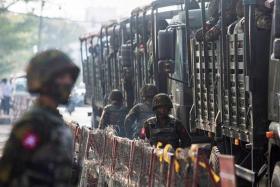Suu Kyi faces free press dilemma
Human rights advocates, journalists alarmed by Nobel Peace Prize winner's treatment of the media
Ms Aung San Suu Kyi is treating the press in Myanmar poorly, and that may impede her efforts to democratise the conflict-wrought country.
But is her apparent authoritarian streak mere caution?
Expanding civil liberties too forcefully could bait the former junta into retaking full control of the South-east Asian nation.
Before becoming Myanmar's state counsellor, Ms Suu Kyi was considered a hero among Western democrats due to her role as a leader during the 1988 uprisings against the military-run government, which led to her being placed under house arrest repeatedly from 1989 until 2010. In 1991, she won the Nobel Peace Prize for her efforts.
Now, her image has been sullied. Human rights advocates and journalists are alarmed by her treatment of the media and fear the erosion of gains in freedom of speech. Ms Suu Kyi has been calling on the nation to follow state-run news reports and keeping independent media at a distance.Her security detail has physically prevented foreign reporters from asking questions.
In 2013, Myanmar's legislature enacted the Telecommunications Law, the most controversial aspect of which is arguably section 66D. Under it, anyone can press charges over Internet, phone, radio and TV content, regardless of whether he is the subject.
The maximum sentence for being convicted on section 66D charges is three years.
The free speech advocacy organisation PEN Myanmar said at least 80 cases invoking section 66D have been filed since the law was passed; 73 occurred since Ms Suu Kyi came to power last year.
Some were prosecuted under the law for making controversial comments about Ms Suu Kyi.
There are small signs that her party is starting to reform media law. The upper house of Myanmar's Assembly approved amendments to section 66D that would prevent third parties from pressing charges without permission from the aggrieved individual, and make it easier for defendants to get bail. But a proposal to abolish it stalled.
There is also the Unlawful Associations Act's section 17(1), in which covering an event can land a journalist in jail if the government disapproves of a person or group present.
Earlier this month, three journalists were denied bail after they were detained under the Act for covering a ceremony organised by the Ta'ang National Liberation Army, the armed wing of a rebel group in Myanmar's Shan State, in June.
Journalism advocates also noted that Ms Suu Kyi often refrains from speaking to the local press, choosing to speak only to international news outlets.
That may be because... during her house arrest, "there was little local media beyond the government newspapers and journals and they were very hostile...," said Ms Priscilla Clapp, the Chief of Mission to the US Embassy in then Burma from 1999 to 2002.
Mr Nai Kasauh Mon, spokesman for Burma News International, said: "I think she and her government do not want to confront… the military...they are afraid to lose their power." - REUTERS
Get The New Paper on your phone with the free TNP app. Download from the Apple App Store or Google Play Store now



